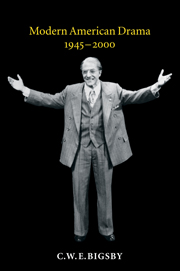Book contents
- Frontmatter
- Contents
- Preface to First Edition
- Preface to Second Edition
- 1 The absent voice: American drama and the critic
- 2 Eugene O'Neill's Endgame
- 3 Tennessee Williams: the theatricalising self
- 4 Arthur Miller: the moral imperative
- 5 Edward Albee: journey to apocalypse
- 6 A Broadway interlude
- 7 Sam Shepard: imagining America
- 8 David Mamet: all true stories
- 9 The performing self
- 10 Redefining the centre: politics, race, gender
- 11 Beyond Broadway
- Notes
- Index
3 - Tennessee Williams: the theatricalising self
Published online by Cambridge University Press: 10 December 2009
- Frontmatter
- Contents
- Preface to First Edition
- Preface to Second Edition
- 1 The absent voice: American drama and the critic
- 2 Eugene O'Neill's Endgame
- 3 Tennessee Williams: the theatricalising self
- 4 Arthur Miller: the moral imperative
- 5 Edward Albee: journey to apocalypse
- 6 A Broadway interlude
- 7 Sam Shepard: imagining America
- 8 David Mamet: all true stories
- 9 The performing self
- 10 Redefining the centre: politics, race, gender
- 11 Beyond Broadway
- Notes
- Index
Summary
The pre-war world was another country. From the distance of the mid to late forties and early fifties it seemed secure, reassuring, but in fact the Depression had destroyed one version of America and the Hitler–Stalin pact another. Wartime rhetoric had reinvented smalltown America, an amalgam of Thornton Wilder's Our Town and Saturday Evening Post covers, where old values were preserved and celebrated, a world worth fighting for; now that was already fading into history. William Inge, Carson McCullers and Robert Anderson might continue to place it at the centre of their work, but in doing so showed how bleak it could be until redeemed by an ambiguous love.
And of course, something radical had happened. In Europe 6 million Jews had been systematically put to death. In Japan, the heat of the sun had been replicated by man over two major cities. If Virginia Woolf had suggested that human nature changed in 1910 there were now other dates with greater claim to mark a shift in human affairs. Certainly American notions of the autonomous self, secure and morally inviolable, seemed suddenly more difficult to sustain. The enemy was no longer simple modernity, the inhuman scale, the mechanical rhythms against which Eugene O'Neill and Elmer Rice, Sidney Kingsley and the young Miller and Williams had railed. It was a flaw in the sensibility that made betrayal seem a natural impulse and the self complicit in its own annihilation. It was no longer a case of pitching an integral self against anonymity and social despair for now that self is presented as fragmented and insecure.
- Type
- Chapter
- Information
- Modern American Drama, 1945–2000 , pp. 31 - 68Publisher: Cambridge University PressPrint publication year: 2000



